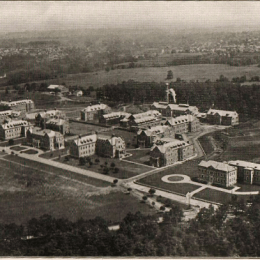
Situated approximately 18.7 miles away from Eastern University, the remains of the Pennhurst State School and Hospital stand as a reminder of maltreatment and captivity.
Established in 1908, Pennhurst State School and Hospital, originally known as the Eastern Pennsylvania State Institution for the Feeble-Minded and Epileptic, officially opened and admitted residents. In addition to many other institutions in the United States, Pennhurst aimed to segregate individuals with intellectual and developmental disabilities from the rest of society. For over eight decades, a total of roughly 10,600 children and adults lived the vast majority of their lives, if not their entire lives, within the perpetual quarantine of Pennhurst.
Although Pennhurst was established to care for people with seizure disorders and intellectual disabilities, the institution experienced overcrowding as many people without these conditions were admitted. Pennhurst also admitted people without parental figures, immigrants, people with mental illnesses, people who were blind or deaf, and people labelled as “delinquents.” Unclaimed by society, the individuals admitted to Pennhurst had no one advocating for their well-being or freedom. Upon entering Pennhurst, residents lost their right to leave and their ability to exercise the most basic of human rights. “Medical experimentation, cruel punishments, and the constant threats to physical and psychological well-being were part of the institutional culture,” The Philadelphia Inquirer explained.
In 1968, Bill Baldini, a reporter, travelled to Chester County after receiving a tip surrounding the conditions at Pennhurst. Due to tight restrictions on who was allowed into Pennhurst, no reporter prior to Baldini had received such open access to the institution. Baldini was met with emaciated residents who were tied to their beds, locked in cages, and placed into solitary confinement. Immediately, the young reporter left the institution and returned with his camera crew. “And we start shooting, and my crew was mortified. I mean, I had trouble keeping them on the job, because they were literally getting sick from what they saw,” Baldini stated.
“Suffer the Little Children,” — the title stemming from the Gospel of Mark — was a five-part series produced by Baldini and his crew regarding Pennhurst. The film depicted the neglectful and abusive circumstances that gave insights into how governmental systems can grow conditioned to the dehumanization of people. Although the release of the documentary ensued several advancements, such as the creation of early community support, the circumstances at Pennhurst continued to decline.
On May 30, 1974, Halderman v. Pennhurst State School and Hospital was filed on behalf of former and present Pennhurst residents against the institution, its superintendents, and state officials responsible for Pennhurst’s operation. Pennhurst was officially closed as an institution in 1987, leaving a vacant building and traumatized former residents.
In 2008, real-estate investor Richard Chakejian partnered with Randy Bates, who maintains a haunted-house business, in transforming Pennhurst State School and Hospital into Pennhurst Asylum, a Halloween attraction. Thousands of guests enter the former institution, yearning to be scared by actors dressed as bloodied patients and doctors. “PennHurst, the legendary haunted hospital complex, has opened its doors after 25 years and is accepting new patients!” the Pennhurst Asylum Haunted House website states.
Pennhurst’s transformation into a haunted house has stirred controversy throughout the nation. “Haunted asylum attractions make people with mental illness into grotesque caricatures and perpetuate the spurious linkage between mental disorders and violence,” The Philadelphia Inquirer stated. Meanwhile, others have argued, “The public that comes through here know the distinction and the difference between making fun of something and a Halloween event,” NPR explained.
The ethics of transforming a space of human suffering into an entertainment attraction has led to questions regarding how society views and treats those with disabilities. As the discrimination of individuals with disabilities and mental illnesses unjustly persists, activists ask haunted house attendees to think critically about what is being mimicked in the attraction and the history of the haunted houses’s location.
Sources: The Philadelphia Inquirer, NPR, Pennhurst Asylum Haunted House, Antiquity Echoes, The Encyclopedia of Greater Philadelphia
